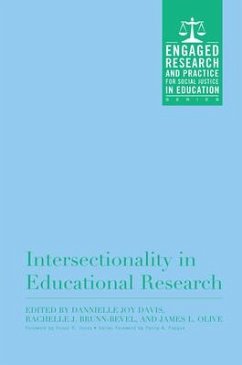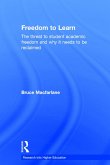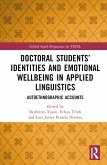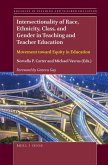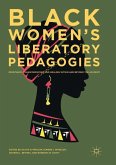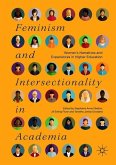Intersectionality in Educational Research
Herausgeber: Davis, Dannielle Joy; Brunn-Bevel, Rachelle J; Olive, James L
Intersectionality in Educational Research
Herausgeber: Davis, Dannielle Joy; Brunn-Bevel, Rachelle J; Olive, James L
- Gebundenes Buch
- Merkliste
- Auf die Merkliste
- Bewerten Bewerten
- Teilen
- Produkt teilen
- Produkterinnerung
- Produkterinnerung
The purpose of this work is to advance understanding of intersectional theory and its application to research in education. The book illustrates how intersectional theory can be used in both quantitative and qualitative education research on college student access and success, faculty satisfaction and professional development, and K-12 educational issues such as high school dropouts and bullying.
Andere Kunden interessierten sich auch für
![Freedom to Learn Freedom to Learn]() Bruce MacfarlaneFreedom to Learn180,99 €
Bruce MacfarlaneFreedom to Learn180,99 €![Doing Educational Research in Rural Settings Doing Educational Research in Rural Settings]() Doing Educational Research in Rural Settings202,99 €
Doing Educational Research in Rural Settings202,99 €![Doctoral Students' Identities and Emotional Wellbeing in Applied Linguistics Doctoral Students' Identities and Emotional Wellbeing in Applied Linguistics]() Doctoral Students' Identities and Emotional Wellbeing in Applied Linguistics178,99 €
Doctoral Students' Identities and Emotional Wellbeing in Applied Linguistics178,99 €![Graduate Careers in Context Graduate Careers in Context]() Graduate Careers in Context202,99 €
Graduate Careers in Context202,99 €![Intersectionality of Race, Ethnicity, Class, and Gender in Teaching and Teacher Education Intersectionality of Race, Ethnicity, Class, and Gender in Teaching and Teacher Education]() Intersectionality of Race, Ethnicity, Class, and Gender in Teaching and Teacher Education143,99 €
Intersectionality of Race, Ethnicity, Class, and Gender in Teaching and Teacher Education143,99 €![Black Women's Liberatory Pedagogies Black Women's Liberatory Pedagogies]() Black Women's Liberatory Pedagogies19,99 €
Black Women's Liberatory Pedagogies19,99 €![Feminism and Intersectionality in Academia Feminism and Intersectionality in Academia]() Feminism and Intersectionality in Academia103,99 €
Feminism and Intersectionality in Academia103,99 €-
-
-
The purpose of this work is to advance understanding of intersectional theory and its application to research in education. The book illustrates how intersectional theory can be used in both quantitative and qualitative education research on college student access and success, faculty satisfaction and professional development, and K-12 educational issues such as high school dropouts and bullying.
Hinweis: Dieser Artikel kann nur an eine deutsche Lieferadresse ausgeliefert werden.
Hinweis: Dieser Artikel kann nur an eine deutsche Lieferadresse ausgeliefert werden.
Produktdetails
- Produktdetails
- Verlag: Taylor & Francis
- Seitenzahl: 330
- Erscheinungstermin: 8. Juli 2015
- Englisch
- Abmessung: 236mm x 150mm x 20mm
- Gewicht: 408g
- ISBN-13: 9781620360958
- ISBN-10: 1620360950
- Artikelnr.: 41968583
- Herstellerkennzeichnung
- Libri GmbH
- Europaallee 1
- 36244 Bad Hersfeld
- 06621 890
- Verlag: Taylor & Francis
- Seitenzahl: 330
- Erscheinungstermin: 8. Juli 2015
- Englisch
- Abmessung: 236mm x 150mm x 20mm
- Gewicht: 408g
- ISBN-13: 9781620360958
- ISBN-10: 1620360950
- Artikelnr.: 41968583
- Herstellerkennzeichnung
- Libri GmbH
- Europaallee 1
- 36244 Bad Hersfeld
- 06621 890
Dannielle Joy Davis James L. Olive Rachelle J. Brunn-Bevel Susan R. Jones is professor in the higher education and student affairs program in the Department of Educational Studies at The Ohio State University.
Foreword-Susan R. Jones Series Foreword-Penny A. Pasque
Introduction-Rachelle J. Brunn-Bevel, Danielle Joy Davis, and James L.
Olive Part One. Intersectionality and Methodologies 1. Queering the
Intersectional Lens. A Conceptual Model for the Use of Queer Theory in
Intersectional Research-James L. Olive 2. A Case for Using Qualitiative
Inquiry to Study Intersectionality in College Students-Annemarie Vaccaro 3.
Salience at the Intersection. Latina/o Identities Across Different Campus
Contexts-Adriana Ruiz Alvarado and Sylvia Hurtado Part Two.
Intersectionality and K-12 Education 4. Teacher's Perspectives on Race and
Racial Inequality. Strategic Intersectionality and the Countervailing
Effects of Privilege-Laurie Cooper Stoll 5. Gender in Schools. Constructing
Identity in High School-Sarah Prior Part Three. Intersectionality and
Postsecondary Education 6. Understanding the Academic Achievement of Latina
College Graduates. A Call for Intersectionality as a Methodological
Framework-María Oropeza Fujimoto 7. Intersectionality of Multiple Racisms.
A Case Study of Campus Climate for Three Mixed Race Undergraduate
Women-Chelsea Guillermo-Wann 8. Intersectionality in and of Race. Identity
Construction Re/Considered-Alina S. Wong 9. "Writing Our Own Rule Book".
Exploring the Intersectionality of Gay College Men-Daniel Tillapaugh 10.
Subaltern Supermen. Intersecting Masculinities and Disabilities in Popular
Culture-Karen A. Myers, Jason A. Laker, and Claire Lerchen Minneman Part
Four. Intersectionality and Academe 11. Interlocking Oppressions. An
Intersectional Analysis of Diversity in Diversity Action Plans at U.S.
Land-Grant Universities-Susan V. Iverson 12. In the "Web" of the
Twenty-First Century American Academy. Reflections of a Black and an Indian
Female Faculty-Namita N. Manohar and Pauline E. Bullen 13. Me-Search IS
Research. My Socialization as an Academic-Tamara Bertrand Jones 14. The
Experiences of Marginalized Academics and Understanding the Majority.
Implications for Institutional Policy and Practice-Dannielle Joy Davis
Conclusion-James L. Olive Reflective Questions Editors and Contributors
Index
Introduction-Rachelle J. Brunn-Bevel, Danielle Joy Davis, and James L.
Olive Part One. Intersectionality and Methodologies 1. Queering the
Intersectional Lens. A Conceptual Model for the Use of Queer Theory in
Intersectional Research-James L. Olive 2. A Case for Using Qualitiative
Inquiry to Study Intersectionality in College Students-Annemarie Vaccaro 3.
Salience at the Intersection. Latina/o Identities Across Different Campus
Contexts-Adriana Ruiz Alvarado and Sylvia Hurtado Part Two.
Intersectionality and K-12 Education 4. Teacher's Perspectives on Race and
Racial Inequality. Strategic Intersectionality and the Countervailing
Effects of Privilege-Laurie Cooper Stoll 5. Gender in Schools. Constructing
Identity in High School-Sarah Prior Part Three. Intersectionality and
Postsecondary Education 6. Understanding the Academic Achievement of Latina
College Graduates. A Call for Intersectionality as a Methodological
Framework-María Oropeza Fujimoto 7. Intersectionality of Multiple Racisms.
A Case Study of Campus Climate for Three Mixed Race Undergraduate
Women-Chelsea Guillermo-Wann 8. Intersectionality in and of Race. Identity
Construction Re/Considered-Alina S. Wong 9. "Writing Our Own Rule Book".
Exploring the Intersectionality of Gay College Men-Daniel Tillapaugh 10.
Subaltern Supermen. Intersecting Masculinities and Disabilities in Popular
Culture-Karen A. Myers, Jason A. Laker, and Claire Lerchen Minneman Part
Four. Intersectionality and Academe 11. Interlocking Oppressions. An
Intersectional Analysis of Diversity in Diversity Action Plans at U.S.
Land-Grant Universities-Susan V. Iverson 12. In the "Web" of the
Twenty-First Century American Academy. Reflections of a Black and an Indian
Female Faculty-Namita N. Manohar and Pauline E. Bullen 13. Me-Search IS
Research. My Socialization as an Academic-Tamara Bertrand Jones 14. The
Experiences of Marginalized Academics and Understanding the Majority.
Implications for Institutional Policy and Practice-Dannielle Joy Davis
Conclusion-James L. Olive Reflective Questions Editors and Contributors
Index
Foreword-Susan R. Jones Series Foreword-Penny A. Pasque
Introduction-Rachelle J. Brunn-Bevel, Danielle Joy Davis, and James L.
Olive Part One. Intersectionality and Methodologies 1. Queering the
Intersectional Lens. A Conceptual Model for the Use of Queer Theory in
Intersectional Research-James L. Olive 2. A Case for Using Qualitiative
Inquiry to Study Intersectionality in College Students-Annemarie Vaccaro 3.
Salience at the Intersection. Latina/o Identities Across Different Campus
Contexts-Adriana Ruiz Alvarado and Sylvia Hurtado Part Two.
Intersectionality and K-12 Education 4. Teacher's Perspectives on Race and
Racial Inequality. Strategic Intersectionality and the Countervailing
Effects of Privilege-Laurie Cooper Stoll 5. Gender in Schools. Constructing
Identity in High School-Sarah Prior Part Three. Intersectionality and
Postsecondary Education 6. Understanding the Academic Achievement of Latina
College Graduates. A Call for Intersectionality as a Methodological
Framework-María Oropeza Fujimoto 7. Intersectionality of Multiple Racisms.
A Case Study of Campus Climate for Three Mixed Race Undergraduate
Women-Chelsea Guillermo-Wann 8. Intersectionality in and of Race. Identity
Construction Re/Considered-Alina S. Wong 9. "Writing Our Own Rule Book".
Exploring the Intersectionality of Gay College Men-Daniel Tillapaugh 10.
Subaltern Supermen. Intersecting Masculinities and Disabilities in Popular
Culture-Karen A. Myers, Jason A. Laker, and Claire Lerchen Minneman Part
Four. Intersectionality and Academe 11. Interlocking Oppressions. An
Intersectional Analysis of Diversity in Diversity Action Plans at U.S.
Land-Grant Universities-Susan V. Iverson 12. In the "Web" of the
Twenty-First Century American Academy. Reflections of a Black and an Indian
Female Faculty-Namita N. Manohar and Pauline E. Bullen 13. Me-Search IS
Research. My Socialization as an Academic-Tamara Bertrand Jones 14. The
Experiences of Marginalized Academics and Understanding the Majority.
Implications for Institutional Policy and Practice-Dannielle Joy Davis
Conclusion-James L. Olive Reflective Questions Editors and Contributors
Index
Introduction-Rachelle J. Brunn-Bevel, Danielle Joy Davis, and James L.
Olive Part One. Intersectionality and Methodologies 1. Queering the
Intersectional Lens. A Conceptual Model for the Use of Queer Theory in
Intersectional Research-James L. Olive 2. A Case for Using Qualitiative
Inquiry to Study Intersectionality in College Students-Annemarie Vaccaro 3.
Salience at the Intersection. Latina/o Identities Across Different Campus
Contexts-Adriana Ruiz Alvarado and Sylvia Hurtado Part Two.
Intersectionality and K-12 Education 4. Teacher's Perspectives on Race and
Racial Inequality. Strategic Intersectionality and the Countervailing
Effects of Privilege-Laurie Cooper Stoll 5. Gender in Schools. Constructing
Identity in High School-Sarah Prior Part Three. Intersectionality and
Postsecondary Education 6. Understanding the Academic Achievement of Latina
College Graduates. A Call for Intersectionality as a Methodological
Framework-María Oropeza Fujimoto 7. Intersectionality of Multiple Racisms.
A Case Study of Campus Climate for Three Mixed Race Undergraduate
Women-Chelsea Guillermo-Wann 8. Intersectionality in and of Race. Identity
Construction Re/Considered-Alina S. Wong 9. "Writing Our Own Rule Book".
Exploring the Intersectionality of Gay College Men-Daniel Tillapaugh 10.
Subaltern Supermen. Intersecting Masculinities and Disabilities in Popular
Culture-Karen A. Myers, Jason A. Laker, and Claire Lerchen Minneman Part
Four. Intersectionality and Academe 11. Interlocking Oppressions. An
Intersectional Analysis of Diversity in Diversity Action Plans at U.S.
Land-Grant Universities-Susan V. Iverson 12. In the "Web" of the
Twenty-First Century American Academy. Reflections of a Black and an Indian
Female Faculty-Namita N. Manohar and Pauline E. Bullen 13. Me-Search IS
Research. My Socialization as an Academic-Tamara Bertrand Jones 14. The
Experiences of Marginalized Academics and Understanding the Majority.
Implications for Institutional Policy and Practice-Dannielle Joy Davis
Conclusion-James L. Olive Reflective Questions Editors and Contributors
Index

